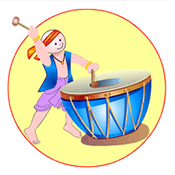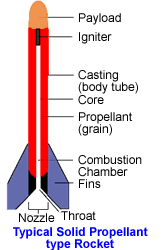
Dimdima
Online Children's Magazine from India

Dimdima
Online Children's Magazine from India
Solid Propellant Rockets

Most rockets today work either with solid propellants or liquid propellants. The propellant does not just mean fuel, it also includes the oxidizer, a substance that releases oxygen. The rocket has to carry an oxidizer because there is no oxygen available in outer space, and in the absence of oxygen the fuel will not burn.
In solid propellant rocket engines the fuel and the oxidizer are both combined together in the chemical. The earliest rockets made by the Chinese were of the solid propellant type. They consisted of a tube filled with the propellant – charcoal, saltpetre and sulphur - and were ignited at the bottom.
Most solid propellant rockets today have a hollow core running down the length of the rocket. This increases the surface area of the propellant being burnt and this increases the thrust that is produced by the engine.
In order to increase the surface area of the propellant even further, the core is sometimes hollowed out in the shape of a star.Another significant difference between today’s solid propellant rockets and the earlier ones is that the ignition takes place at the top and the propellant burns from inside out. This also serves to increase the thrust produced.
The original method of beginning the ignition of the rocket was by means of a fuse. This method however, was found to be very unreliable and is no longer in use today.Electronics plays a very important role in providing a safe and reliable means of igniting the rocket from a distance. The earliest type of electronic ignition consisted of a wire that was heated sufficiently for the combustion of the propellant to begin. Other igniters utilize chemicals for the rockets to fire. Larger rockets today sometimes employ smaller rockets for ignition. The smaller rocket is ignited first, and this causes a stream of flame to flow down the core of the main rocket, which ignites the entire surface area of the propellant in a fraction of a second.
EXPLORE MORE...
Get Help or Give Help.
- Do you have a Science Question?
- Post it here and get the answer.
- Some questions posted by others are not yet answered.
- View those questions and answer them.
Dimdima is the Sanskrit word for ‘drumbeat’. In olden days, victory in battle was heralded by the beat of drums or any important news to be conveyed to the people used to be accompanied with drumbeats.
Bharatiya Vidya Bhavan
K. M Munshi Marg,
Chowpatty, Mumbai - 400 007
email : editor@dimdima.com
Bharatiya Vidya Bhavan
505, Sane Guruji Marg,
Tardeo, Mumbai - 400 034
email : promo@dimdima.com
Dimdima.com, the Children's Website of Bharatiya Vidya Bhavan launched in 2000 and came out with a Printed version of Dimdima Magazine in 2004. At present the Printed Version have more than 35,000 subscribers from India and Abroad.